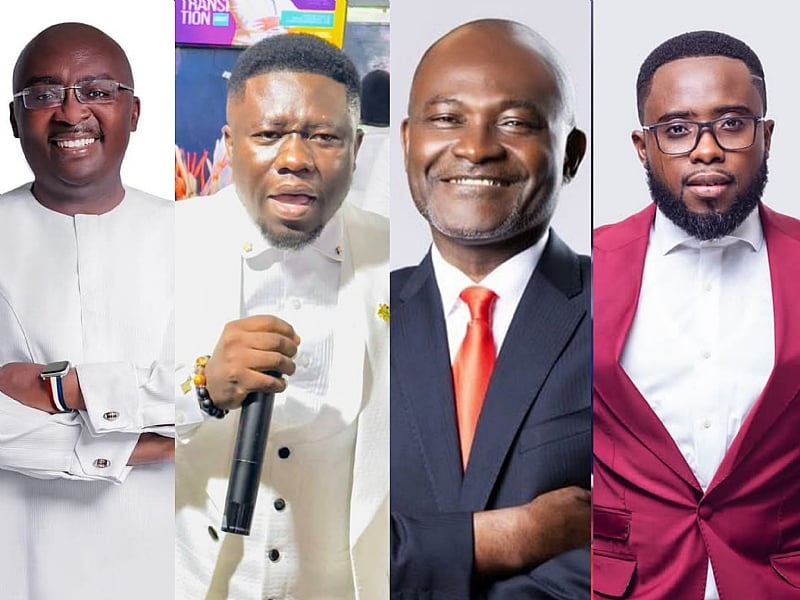Two Prophets, Two Visions: Divergent Prophecies on Ghana’s NPP 2028 Flagbearer
The Ghanaian political landscape is abuzz with anticipation as the nation looks towards the 2028 elections. Adding to the fervor are two prominent prophets, Prophet Emmanuel Worlasi of Conquers Chapel and Prophet Bernard ElBernard Nelson-Eshun of Spiritlife Revival Ministries, who have offered contrasting prophetic visions regarding the New Patriotic Party’s (NPP) future flagbearer. Their pronouncements, steeped in religious symbolism and divine revelation, have ignited debate and speculation, further intensifying the already charged political atmosphere.
Prophet Worlasi’s vision depicts a contest between Vice President Dr. Mahamudu Bawumia and Hon. Kennedy Agyapong. He describes witnessing a vast crowd, initially larger in support of Agyapong, dramatically shifting allegiance to Bawumia at the crucial moment of voting. The prophet interprets this as a strategic maneuver by those influenced by certain party leaders to outwardly support Agyapong while secretly favoring Bawumia. This hidden support ultimately leads to Bawumia’s victory in the vision. Prophet Worlasi emphasizes his established record of accurate prophecies, citing past predictions of significant global events, including the deaths of prominent figures and political upheavals, to lend credence to his current vision.
In contrast, Prophet Nelson-Eshun’s prophecy foretells the rise of Hon. Kennedy Agyapong as the NPP’s flagbearer. He details a divine journey where an angel reveals to him initially hesitant elites questioning Agyapong’s leadership capabilities. However, the vision then shifts to a groundswell of support from passionate youth who embrace Agyapong’s vision and drive his campaign with fervor. This grassroots movement eventually sways the initially skeptical elites, leading to Agyapong’s eventual triumph and the revitalization of the NPP. Prophet Nelson-Eshun presents his vision as a phased revelation, suggesting that further details will be unveiled in due time.
These contrasting prophecies inject a layer of spiritual intrigue into the political discourse surrounding the NPP’s future leadership. While Prophet Worlasi’s vision points towards a strategic victory for Bawumia despite apparent initial support for Agyapong, Prophet Nelson-Eshun’s prophecy emphasizes a grassroots movement propelling Agyapong to the forefront, eventually winning over even the initially hesitant establishment. Both prophets, however, highlight the importance of divine intervention in shaping political outcomes, further complicating the analysis and predictions surrounding the 2028 elections.
The differing visions raise several questions. Will the initial outward support for Agyapong, as depicted by Prophet Worlasi, materialize, or will the youth-driven movement envisioned by Prophet Nelson-Eshun gain enough momentum to overcome any initial resistance? Will the party elites play the decisive role suggested in both prophecies, either by strategically maneuvering behind the scenes or by eventually succumbing to the pressure of a grassroots movement? These questions underscore the complex interplay of various factors – popular sentiment, elite influence, and perhaps even divine intervention – that may ultimately determine the NPP’s choice of flagbearer.
The prophecies also highlight the role of religion and spirituality in Ghanaian politics. The pronouncements of these prophets carry significant weight among certain segments of the population and can influence political perceptions and allegiances. This adds another layer of complexity to an already dynamic political landscape, making the path to the 2028 elections even more unpredictable. While the prophecies themselves offer contrasting outcomes, they both contribute to the heightened anticipation and speculation surrounding the NPP’s future leadership.
Ultimately, the true test of these prophetic visions lies in the unfolding political events leading up to the 2028 elections. As the NPP navigates its internal dynamics, manages its public image, and strategizes for the future, the nation will watch closely to see whether the divine insights purportedly revealed to these prophets bear any resemblance to the eventual reality. Until then, the contrasting prophecies serve as a reminder of the multiple forces – both seen and unseen – that shape the political destinies of nations. They also underscore the important role of interpretation and the potential for diverse understandings of even divinely inspired messages. Whether these prophecies prove accurate or not, they undoubtedly contribute to the rich tapestry of Ghanaian political and religious life.














